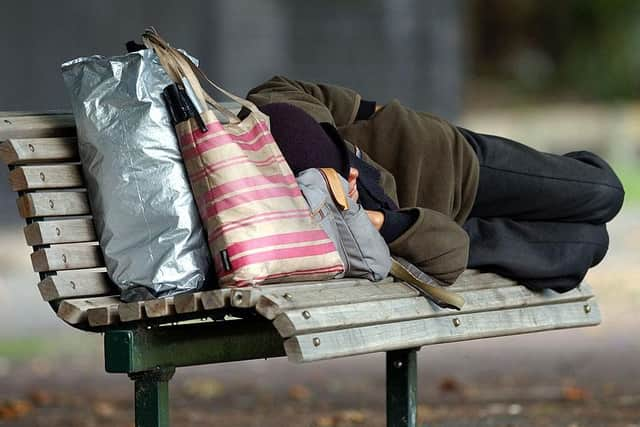Drop in number of homeless people using Northamptonshire trust's mental health services during Covid
and live on Freeview channel 276
The number of homeless people using Northamptonshire Healthcare NHS Foundation Trust (NHFT) mental health services dropped during the first year of the coronavirus pandemic.
A trust spokesperson said it is committed to providing mental health support for people across the county.
Advertisement
Hide AdAdvertisement
Hide AdA charity boss believes this does not suggest there has been a decrease in need for such support and many factors could have affected the figures.


Robin Burgess, the chief executive of Hope Group, which runs Northampton Hope Centre, said they are working with NHFT to address those needs.
"We are confident that although the absolute numbers on the street have greatly reduced due to the great work done locally, the need amongst those still there and still in supported housing remains high," he said.
"Very recently Hope, in partnership with NHFT, the local mental health services trust, have recently created a new post, based at Hope but jointly employed, to respond to the needs of homeless people with mental health issues and this service is proving very much used already, through our mental health crisis cafes.
Advertisement
Hide AdAdvertisement
Hide Ad"There are sadly always needs for services related to mental health amongst the homeless, but Hope and NHFT remain committed to meeting those needs as they arise."
The BBC Shared Data Unit, which this newspaper is a part of, analysed how Covid affected the number of homeless people in contact with mental health services across the country using sent Freedom of Information Act requests.
Northamptonshire Healthcare NHS Foundation Trust had a 21 per cent drop between February 2020 and March 2021 - the sixth largest decrease in the country, of the 32 trusts who responded (21 did not).
A trust spokesperson said: “During the last year we have continued to work with our whole population to provide face-to-face support for anyone experiencing mental health difficulty, this includes people who are homeless.
Advertisement
Hide AdAdvertisement
Hide Ad"This has been delivered through a number of different services including Crisis Cafes, delivered in partnership with Mind as well as the Hope Centre in Northampton.
"The Mental Health Number was launched in March 2020, which offers 24 hour support seven days a week for anyone experiencing mental health difficulty.
"Mental health navigators will work with the individual to find the support for them. The service can be accessed by anyone in Northamptonshire and offers a single point of access for self-referral to mental health services.
“We work with partner organisations to support vulnerable members of our society to access our services.
Advertisement
Hide AdAdvertisement
Hide Ad"These services have not only continued to operate during the pandemic, providing vital face-to-face support, but we have been able to extend the opening hours of our Crisis Cafes offering further support to our communities.
“As we move forward to offering more face-to-face support, our mental health navigators will be working local authorities in Northamptonshire to offer face-to-face appointments, providing further access to mental health support.”
Mr Burgess said is very difficult to read much into this as mental health services varied widely nationally - some were open differently, some closed, some expanded, some improved and some worsened while recording may not have been prioritised in some areas.
Plus almost all those living on the street were re-located first to hotels and then on to supported housing, meaning many received help on-site rather than through NHS services.
Advertisement
Hide AdAdvertisement
Hide AdCrisis chief executive Jon Sparkes said: “Homelessness has a devastating impact on your health, including your mental health.
“As this data shows, there is considerable variation in the access to mental health services for people who are homeless across the country.
"We need to see the NHS taking a greater role in addressing the mental health of people experiencing homelessness and preventing it from happening in the first place.
“But we also need the UK government to invest in a national Housing First programme.
Advertisement
Hide AdAdvertisement
Hide Ad"Housing First means giving people with multiple needs relating to trauma, addiction and mental health access to long term housing and support as soon as possible.
"By giving people a home and the right support, we can ensure they have the time and space to recover from the brutality of homelessness and rebuild their lives away from it for good.”
A spokesman for the Department of Health and Social Care said: “Covid-19 has affected everyone in the UK and we recognise it has had a disproportionate impact on certain groups of people.
“Throughout the pandemic, community and crisis services have continued to provide support, including by using digital and face to face appointments.
Advertisement
Hide AdAdvertisement
Hide Ad"As we look beyond the pandemic we remain committed to expanding and transforming mental health services in England, backed by £2.3 billion a year by 2023/24.
“Our mental health recovery action plan – supported by £500 million – will ensure we offer the right support in 2021/22 to help people with a variety of mental health conditions, including bringing forward the expansion of integrated primary and secondary care for adults with severe mental illness.”
Comment Guidelines
National World encourages reader discussion on our stories. User feedback, insights and back-and-forth exchanges add a rich layer of context to reporting. Please review our Community Guidelines before commenting.